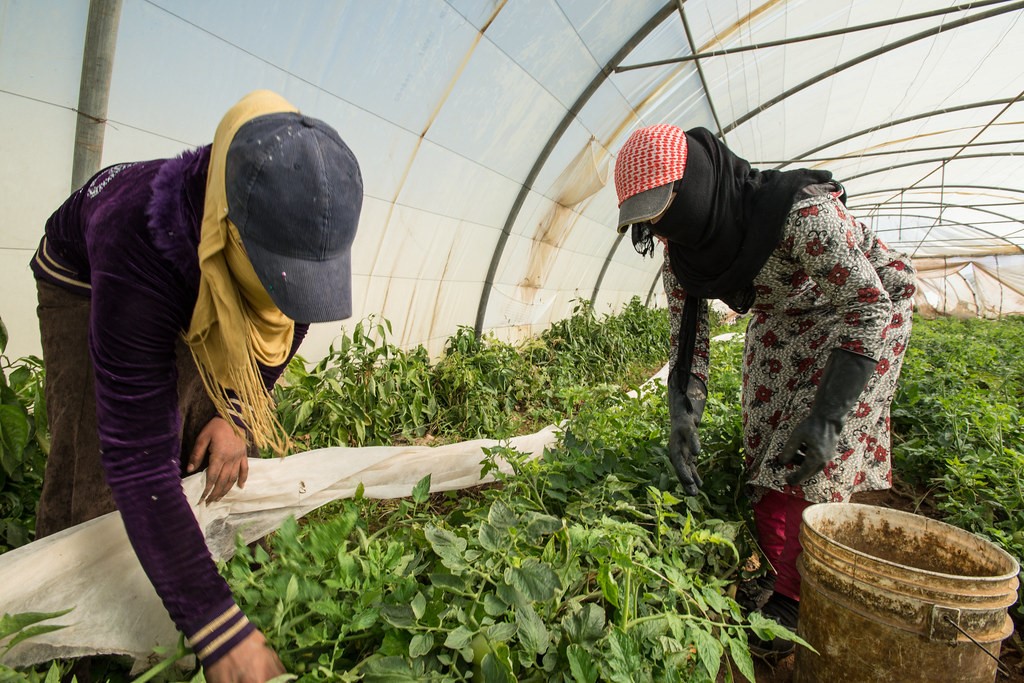Jordan’s agricultural sector is currently at a critical stage, navigating a balance between challenges and opportunities for growth and innovation. With its limited arable land, Jordan heavily relies on food imports to fulfill its domestic requirements. Women in Jordanian society hold significant roles across almost all agricultural and livestock activities, often surpassing men in their level of participation and bearing significant responsibility for ensuring family food security. This blog addresses the dynamic roles and contributions of women within the sector, exploring the complexities of their involvement, the challenges they face, and the initiatives and strategies designed to empower them. By considering extensive data, we uncover the nuances and opportunities for advancing women’s empowerment in Jordan’s agricultural landscape.
Jordan’s Agricultural Profile
The agricultural sector holds significant importance in Jordan’s economy. Despite utilizing around 50% of the country’s water resources, it contributes only 5.9% to the GDP and employs approximately 2-3% of the labor force (International Trade Administration, 2024). Furthermore, 25% of rural poor rely on agriculture, and the majority of Syrian refugees in Jordan are employed in the agricultural sector, underscoring its significance for livelihoods and socio-economic stability (ACTED). Jordan’s agricultural landscape predominantly comprises rain-fed uplands, where cultivation focuses primarily on wheat and barley. Conversely, the irrigated areas situated in the Jordan Valley bear fruit to citrus fruits, potatoes, vegetables, and olives (Britannica). Climate presents a unique challenge for its agricultural sector, with approximately 75% of the country characterized by desert conditions and receiving less than 200 mm of rainfall annually (USAID, 2018). As a net food-importing country, Jordan annually imports nearly $4 billion worth of food and agricultural products, underlining its reliance on external sources (UN Jordan, 2021).
Women’s Roles in Agricultural Sector
Women in Jordan’s agricultural sector is pivotal in crop cultivation, engaging in diverse activities from cultivating citrus, bananas, and olives to growing vegetables, wheat, and barley (FAO, 2008). Their participation spans various stages of production, from cultivation to harvesting, marketing and selling surplus produce. thereby contributing significantly to agricultural diversity, productivity, and household food security (ACTED). When considering women-led agricultural projects in Jordan, we realize the significance of women’s participation, for example: Smart Green for AgriTech Solutions. This project, led by women, has developed innovative systems for precision delivery of water and fertilizers to enhance plant growth (United Nations Jordan, 2023). Despite their significant contributions, women face notable challenges in owning agricultural holdings. Factors such as deteriorating working conditions and societal perceptions hinder women’s ownership, with only 6% of agricultural holdings owned by women (Smart DESERT, 2023). Moreover, in home-based agriculture, women’s ownership of the land being used remains low, with approximately 5%, reflecting broader structural barriers. However, women’s participation in the agricultural sector in Jordan, specifically in home-based agriculture, is one of the highest rates, with their participation rate reaching 73% (UN Women, 2018).
The economic landscape for women in agriculture presents sobering statistics, with 92% of women workers in the sector earning less than the minimum wage (Business & Human Rights Resource Centre, 2021). However, wage disparities between men and women are not significant, indicating broader systemic issues beyond gender-based pay differentials (ILO, 2018).
Empowering Women: A Call to Action
Financial Access:
Access to finance remains a critical factor in empowering women in agriculture. Key agri-lending banks, including Jordan Ahli Bank, Islamic International Arab Bank, and others, play crucial roles in providing financial support to farmers. Additionally, the Agricultural Credit Cooperation, established in 1963, serves as a vital source of credit, offering both conventional and Islamic finance options to farmers (Palladium, 2019). All these funding entities take on the responsibility of empowering agricultural businesses, in addition to their investments in the sector. For example, by leasing their lands for agricultural purposes and providing financial facilities for small and medium-sized agricultural projects related to home-based agriculture, as it represents the highest percentage of women’s participation in this sector.
Training and Support:
Empowering women includes providing training and support, such as comprehensive in-service training, modernizing courses for vocational and higher agricultural education, and encouraging women to enroll in educational programs (FAO, 2022). These initiatives seek to provide individuals with the skills and knowledge they need to succeed in the agricultural sector, while also encouraging personal and professional development. Addressing Jordanian women’s diverse educational needs requires comprehensive strategies. It is critical for educated women to improve workplace conditions, transportation, and entrepreneurial opportunities. Meanwhile, for women with lower levels of education, promoting the care economy and home-based businesses, as well as increasing agricultural employment, particularly in rural areas, is critical to poverty reduction (World Bank, 2019).
Fostering women’s empowerment in Jordan’s agricultural landscape necessitates concerted efforts across multiple fronts. Ensuring full entitlements, including ownership rights, providing equitable access to financial resources, and relaxing procedural barriers are essential steps (Palladium, 2019). Moreover, the adoption of projects by responsible authorities, coupled with streamlined implementation processes, is crucial for driving economic growth and sustainable development.
Strategies for Empowering Women in Jordan’s Agricultural Sector
The empowerment of women in Jordan’s agricultural sector is not merely a moral imperative but a strategic necessity for inclusive growth and prosperity. By addressing challenges, leveraging opportunities, and championing gender-responsive policies, Jordan can unlock the full potential of its female workforce, fostering innovation, resilience, and sustainable development in its agricultural landscape. To further enhance this empowerment, early agricultural education must be prioritized, as should the Kingdom’s limited number of agricultural colleges and research centers. Furthermore, funding and supporting capable women with plans to grow the sector and encourage land-owning women to participate in home-based agriculture by providing low-cost agricultural materials is critical to their participation and success.
Government support for water access in emerging agricultural projects is paramount, and this was a major issue that the Jerina Project faced (RoyaNews, 2023). as is the implementation of special educational programs for low-educated workers and efforts to improve their wages. Furthermore, encouraging agricultural institutions in land-rich countries to lease their lands to female farmers passionate about agriculture will further bolster the sector’s development and inclusivity.
In addition to achieving the Sustainable Development Goals (SDGs), including Goals 2, 9, and 17, these strategies will empower women and promote long-term growth for Jordan’s agricultural landscape. By recognizing the value of women’s participation, Jordan can pave the way for a more equitable and thriving agricultural sector, resulting in broader socioeconomic advancement and prosperity.


